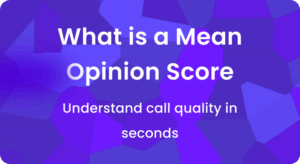In today’s dynamic business landscape, whether your team is engaged in sales or customer support, having a call center sentiment analysis feature integrated into your platform is essential.
This sophisticated tool empowers managers and supervisors to monitor active calls more effectively and intervene when necessary.
Call center sentiment analysis plays a vital role in fully understanding how your customers feel about your products or services.
While it might appear to be a specific analytical tool, it offers valuable insights into various aspects of your organization.
Imagine this: you’re on a call with a customer, and they’re sharing their thoughts and concerns. Sentiment analysis doesn’t just listen to their words; it goes further.
It’s like having a magnifying glass on the tone of their voice, the choice of words they use, and the context of the conversation.
This comprehensive view gives you a deep understanding of their experience and satisfaction.
Wondering how sentiment analysis works, its benefits, and the best ways to implement it in your contact center?
Well, you’re landed at the right place. In this blog, we’re sharing all the important things you need to know about contact center sentiment analysis.
A. What is sentiment analysis, and how does it work in a call center?
Call center sentiment analysis is like having a super-smart tool that helps companies understand how their customers feel when they talk to customer service agents.
It’s like having a language detective that figures out if customers are happy, sad, or just okay. How does it work?
Well, it’s all thanks to advanced technologies like natural language processing and machine learning algorithms that can detect whether a customer’s sentiment is positive, negative, or neutral.
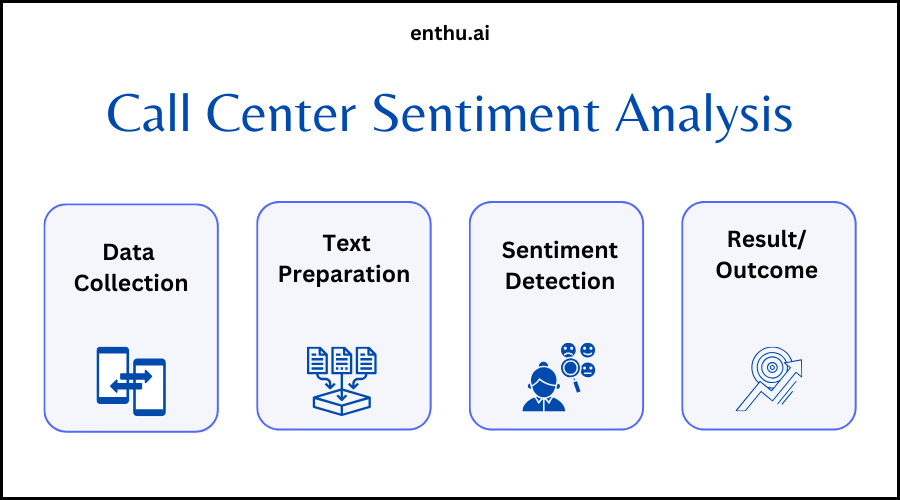
Sentiment analysis works by analyzing various linguistic features, including text, tone, and context, to understand the emotions and opinions expressed by customers during conversations.
Beyond just phone calls and live chats, you can also examine sentiment in reviews, comments, and surveys from your call center and various other communication channels.
If a customer says, “I am extremely satisfied with your service,” sentiment analysis would classify this statement as positive.
Conversely, if a customer says, “I am very frustrated with the product’s quality,” the sentiment analysis would categorize it as negative.
B. Benefits of call center sentiment analysis
1. Identify root causes
Imagine you’re a business owner, and you notice a lot of your customers seem unhappy.
Call center sentiment analysis can help you find out why they’re not satisfied. By studying the conversations they’ve had with your team, you can spot the specific problems.
For example, if many customers are frustrated with a particular product feature, the analysis raises a red flag.
This way, you can fix the issue before more customers get upset.
2. Boost post-call survey data
You probably send out surveys to customers after they’ve had a call with your team.
But here’s the catch: these surveys might take a while to get back, and by then, it could be too late to fix problems.
Call center sentiment analysis swoops in to help. It gives you real-time feedback. So, while the call is still fresh in the customer’s mind, you can quickly check if they’re happy or not.
If there’s a problem, you can jump into action right away, providing solutions and showing that you care about their concerns.
3. Recognize the performance of agents
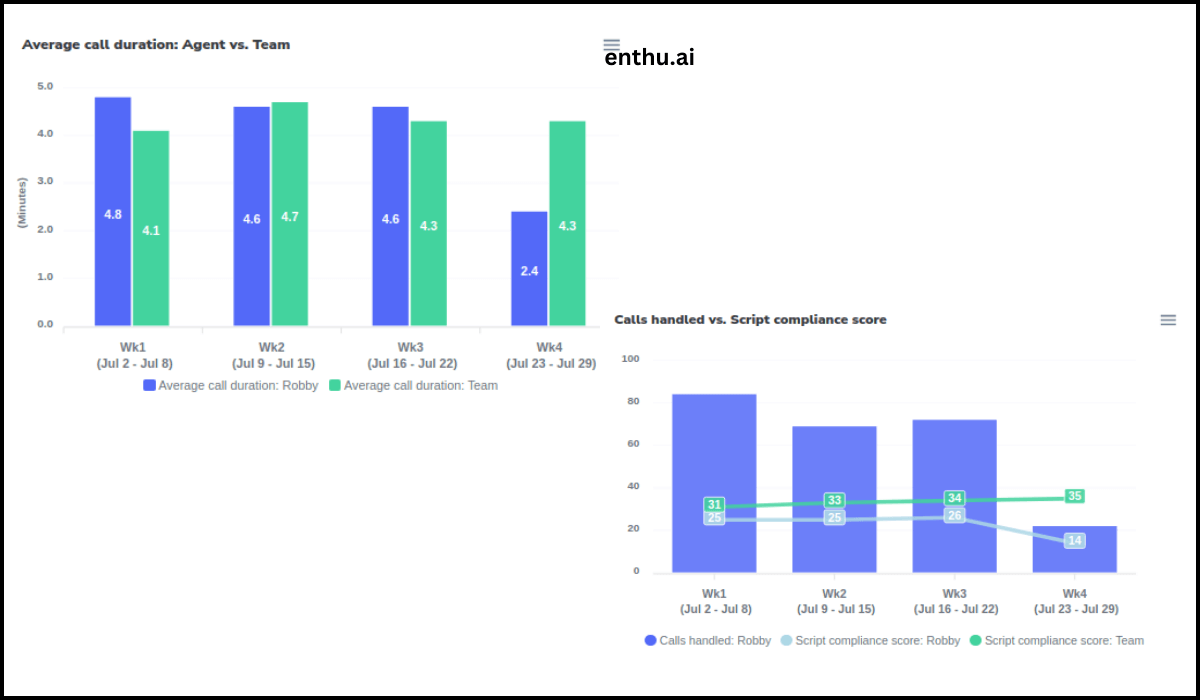
As a manager, you want your team to do their best. But how can you know who’s rocking it and who needs some help? That’s where sentiment analysis comes in.
It watches how your agents handle calls, like a performance scoreboard. If an agent is doing a great job, you can give them a well-deserved pat on the back.
If someone needs improvement, you can offer extra training. This keeps your team motivated and helps everyone do better.
4. Enhance forecasting
When you’re running a call center, you need to predict how many calls you’ll get and when. Accurate forecasting is the key.
Sentiment analysis helps you do that better. It’s like a crystal ball that can see into the future.
By understanding customer moods and behavior, you can allocate your resources perfectly.
That means less waiting for customers and better service quality, which makes everyone happier.
5. Personalize training
Every agent is unique, and they may face different challenges. Sentiment analysis helps you understand what each agent needs to improve. It’s like a tailor-made training program.
For example, if one agent is struggling with handling certain situations, you can provide targeted training to boost their skills.
This personalized approach helps agents adapt to customers’ changing needs, making interactions smoother.
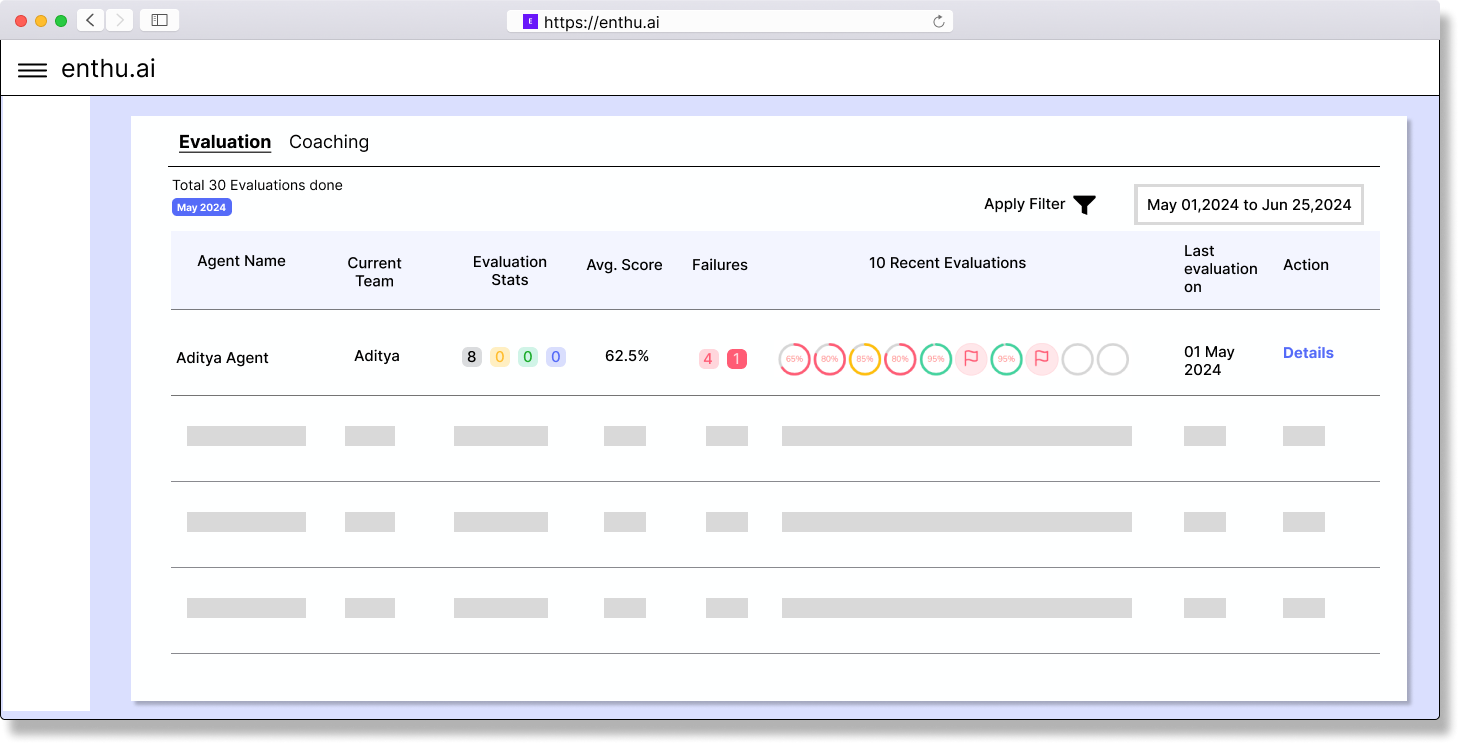
6. Improve products and services
If you want to enhance your products or services, sentiment analysis is like a treasure chest of ideas.
It tells you what customers love and what they don’t. Maybe they adore a particular feature, or they’re not happy with a specific aspect.
By tapping into these insights, you can make improvements. This not only increases customer satisfaction but also shows that you’re listening to their needs.
7. Grow revenue
Happy customers are more likely to become loyal and recommend your products or services to others.
Call center sentiment analysis helps you understand what makes your customers happy and what might make them leave.
This knowledge lets you tailor your offerings and marketing strategies to keep customers loyal and attract new ones. It’s like a recipe for increasing your revenue.
C. How to unlock the full power of call center sentiment analysis
To fully leverage the potential of call center sentiment analysis, consider implementing the following strategies:
1. Encourage open-ended questions
Instead of just sticking to the script, encourage your agents to ask open-ended questions during customer interactions.
These are questions that can’t be answered with a simple “yes” or “no.” They prompt customers to share more details and feelings.
Instead of asking, “Are you satisfied with our service?” your agent can ask, “Tell me about your experience with our service.
” Open-ended questions reveal more about customer sentiment and preferences, making it easier to understand their needs and offer effective solutions.
2. Utilize all available channels
Don’t limit sentiment analysis to just one communication channel.
It’s essential to use it across all channels where your customers reach out – phone calls, emails, chats, social media, and more.
By understanding their experiences across various touchpoints, you can better tailor your responses and improve the overall customer experience.
3. Invest in the right system
When it comes to sentiment analysis, not all systems are created equal.
It’s crucial to choose a call center sentiment analysis system that suits your organization’s unique needs.
Look for a system that offers real-time analysis, high accuracy, and scalability.
Accuracy is vital for dependable results, and scalability ensures the system can grow with your business.
Enthu.AI helps you understand whether your customer was happy or angry during the conversation.
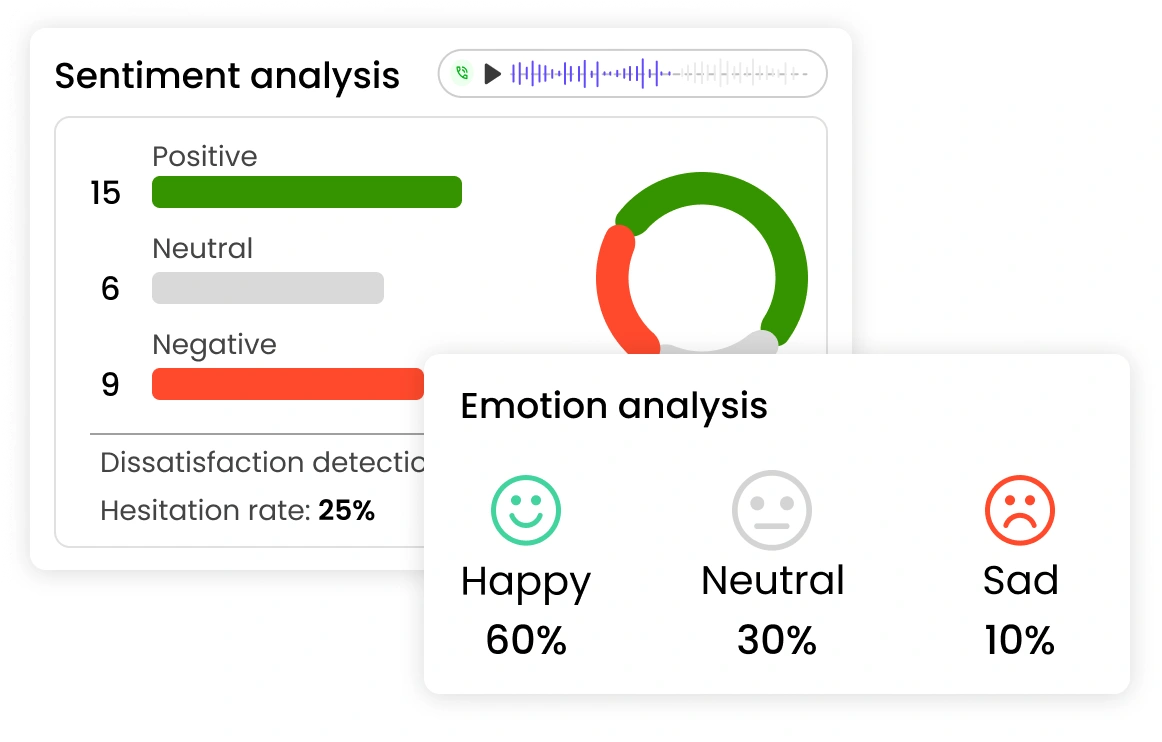
4. Integrate with other tools
Sentiment analysis becomes even more powerful when you integrate it with other call center tools, like quality assurance and call monitoring software.
This integration creates a holistic customer experience management system.
Quality assurance ensures that the service aligns with your company’s standards, while call monitoring helps maintain the quality of interactions.
5. Leverage in agent training
Sentiment analysis data is a goldmine for agent training.
Use it to customize training programs based on individual agent needs.
If sentiment analysis highlights specific areas where agents need improvement, design training that addresses those particular concerns.

6. Embed in KPIs
To make customer satisfaction a measurable goal, integrate sentiment analysis metrics into your key performance indicators (KPIs).
By doing so, you motivate your teams to work towards enhancing customer satisfaction as a concrete target.
7. Try Enthu.AI
Enthu.AI is an incredibly advanced call center software that makes life easier for your call center team, including representatives, managers, and supervisors.
It does this by providing a clear understanding of your customer’s feelings and thoughts during live calls – and it’s super easy to use.
This amazing conversation intelligence software gives you real-time help, turns conversations into written text, and even uses speech analytics.
All of these smart features help you understand what your customers really think and feel.
But that’s not all. Enthu.AI also works seamlessly with your existing systems.
It automatically brings in the data you need, making your contact center run efficiently, and consistently. So, you can be super efficient and make your customers happier all the time.
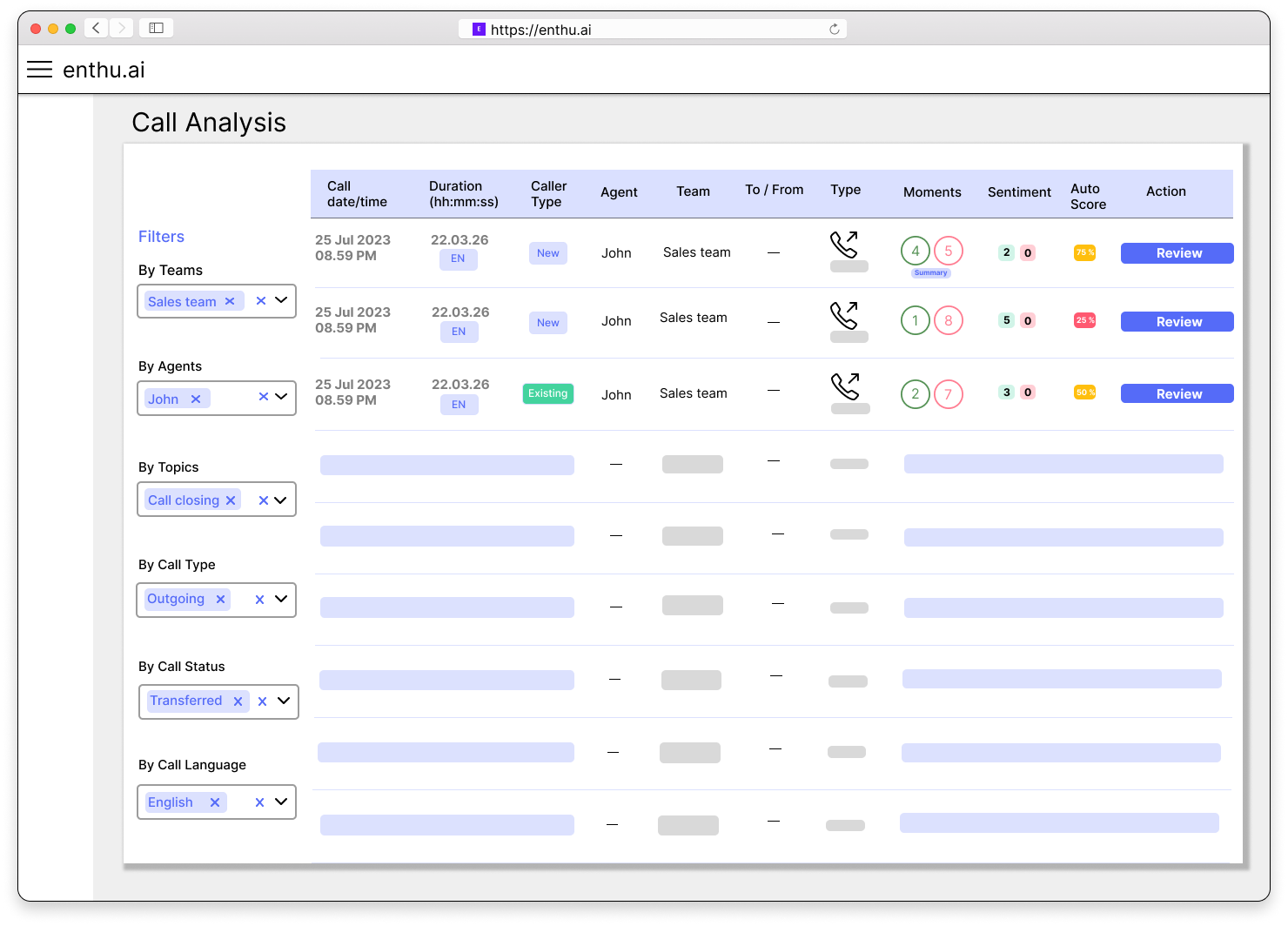
Conclusion
In today’s highly competitive business environment, understanding customer sentiment is essential for maintaining customer satisfaction and achieving business growth.
Call center sentiment analysis is a powerful tool that offers a comprehensive view of customer emotions and opinions during agent interactions.
By applying the strategies mentioned above, organizations can harness the true power of this analytical tool and use it to improve customer experiences, develop better products and services, and ultimately boost revenue.
Call center sentiment analysis is not just about knowing what customers are saying; it’s about truly understanding the meaning behind their words, and that understanding can be a game-changer for your business.
FAQs
1. What is sentiment analysis in a call center?
AI-powered sentiment analysis in call centers helps operators better comprehend client mood, improve replies, and increase customer satisfaction by gauging consumers’ emotions during calls.
2. Is sentiment analysis only relevant for customer service in call centers?
No, sentiment analysis can be applied to various areas of business, such as marketing, product development, and market research. It is a versatile tool for understanding customer sentiment in different contexts.
3. How accurate is call center sentiment analysis in determining customer emotions?
The accuracy of sentiment analysis depends on the quality of the algorithms and data used. Advanced sentiment analysis tools can provide highly accurate results by considering various factors, including text, tone, and context.
4. Can small businesses benefit from call center sentiment analysis as much as large corporations?
Absolutely. Call center sentiment analysis can benefit businesses of all sizes by improving customer satisfaction, identifying areas for improvement, and enhancing customer interactions. It offers valuable insights that can be applied to enhance the customer experience, regardless of the business’s scale.




 On this page
On this page
